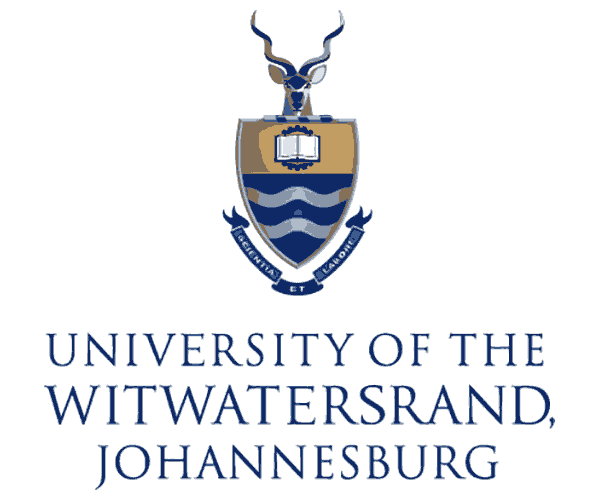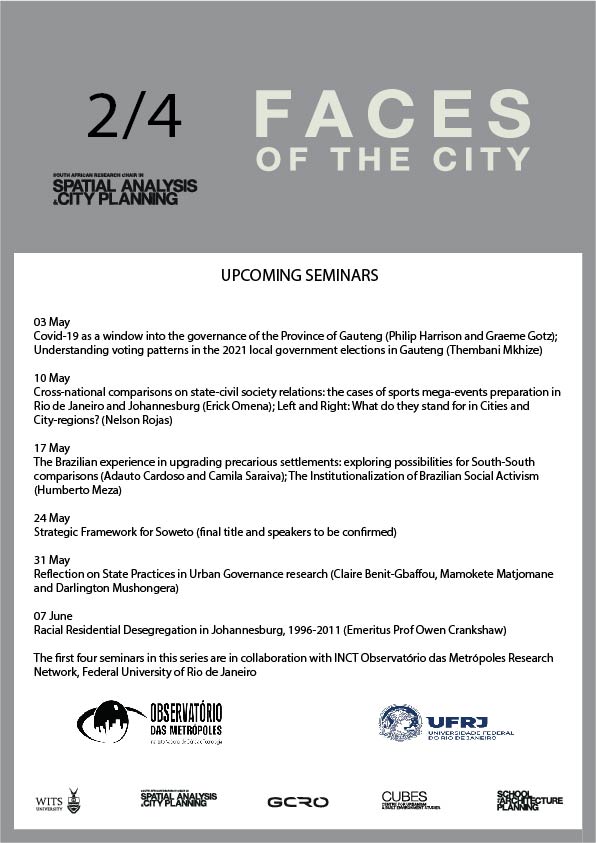Teve início no dia 26 de abril de 2022 os seminários de cooperação internacional “Faces of the City”, organizados conjuntamente pelo INCT Observatório das Metrópoles e o Departamento de Planejamento Urbano da University of the Witwatersrand, de Joanesburgo. A iniciativa tem discutido alguns dos principais desafios urbanos compartilhados pelas metrópoles brasileiras e sul-africanas, como reurbanização de favelas, governança urbana participativa, novas dinâmicas do associativismo urbano contemporâneo e tendências político-eleitorais locais.
Os registros do primeiro e segundo seminário estão disponíveis.
No primeiro encontro, os professores Marie Huchzermeyer e Neil Klug apresentaram uma avaliação crítica do Programa Nacional de Reurbanização de Favelas da África do Sul e de sua implementação ao longo das últimas décadas, em especial na cidade de Joanesburgo. O registro está disponível (senha: 0uDG1#UJ). No segundo encontro, os pesquisadores Graeme Gotz e Philip Harrison abordaram a governança na província de Gauteng (África do Sul) no contexto da pandemia de Covid-19 e Thembani Mkhize os padrões de votos nas eleições locais. O registro também está disponível (senha: 7kr.?=fK).
No dia 10 de maio (terça-feira), às 11 h, dois pesquisadores do Observatório das Metrópoles Núcleo Rio de Janeiro apresentarão os resultados de pesquisas sobre as condições de governança urbana brasileira, bem como as possibilidades de interlocução com a realidade sul-africana. Erick Omena fará a apresentação intitulada “Cross-national comparisons on state-civil society relations: the cases of sports mega-events preparation in Rio de Janeiro and Johannesburg“, enquanto Nelson Rojas apresentará o trabalho “Left and Right: What do they stand for in Cities and City-regions?“.
A programação segue até o dia 07 de junho, com participação aberta ao público. Pesquisadores e estudantes de graduação e pós-graduação brasileiros e sul-africanos são bem-vindos para contribuir com a discussão, que tem como foco a identificação de similaridades e diferenças entre as duas realidades, bem como na reflexão sobre possíveis soluções compartilhadas no âmbito dos programas de reurbanização e voltadas à garantia dos objetivos históricos da reforma urbana.
Os seminários ocorrem através da plataforma Zoom (as apresentações e discussões são realizadas em inglês):
Zoom link: https://wits-za.zoom.us/j/93584078767?pwd=VThtaGxWODZpSUI0Ukg0enh5eFZzdz09
Meeting ID: 935 8407 8767
Passcode: 797408
Confira os próximos eventos (todos com início às 11h, horário de Brasília):
10 May 2022 | Cross-national comparisons on state-civil society relations: the cases of sports mega-events preparation in Rio de Janeiro and Johannesburg – Erick Omena (Observatório das Metrópoles)
How is power exerted by the state to prevent and confront dissent? What are the differences found between countries when considering this issue? What are the main underpinnings of such differences? By exploring international cases of urban redevelopment projects associated with sports mega-events, this research presents some reflections to help answer these questions. As such, the specific objectives of this study are 1) to understand what kind of strategies and tactics have been used by governments to respond to the action of groups unhappy with the impacts of urban developments associated with the FIFA World Cup in Rio de Janeiro and Johannesburg, particularly with their land clearance demands and 2) to contrast the respective results found for each host city.
Erick Omena is a lecturer at the Institute of Research on Urban and Regional Planning / Federal University of Rio de Janeiro (IPPUR-UFRJ) and member of the Observatório das Metrópoles research network. He has a PhD in Spatial Planning and Urban Politics awarded by Oxford Brookes University. His research interests focus on the interface of social theory, urban planning and political economy.
Left and Right: What do they stand for in Cities and City-regions? – Nelson Rojas de Carvalho (Observatório das Metrópoles)
As it is widely known in the fields of public policy and urban studies, research work on the impact of ideology and party politics on cities’ policy outputs is few and far between. Even though ideology and political orientation have been placed in a central position in the studies on elections, voter’s choice, electoral coalitions, and government formation, they have been destined to a marginal position as a variable able to explain policy outputs, both at the national and subnational levels. As Douglas and Sharpe (1984) remind us, until recently “output “analyses were the domain of disciplines such as economics and sociology. Policy results were mainly explained by sociodemographic factors.
While following the same intellectual path of output research, we have tried to evaluate to what extent the neoliberal wave that swept Latin American cities in the last two decades has been either fastened or braked by political factors. In a word, if Latin American cities, severely affected by huge national deficits, have resorted to neoliberal regulatory practices, and have been acting more and more like “growth machines”, it was reasonable to expect that the neo-liberalization process could be, if not completely reversed, hindered in left-oriented municipalities. With the database of 5,570 Brazilian municipalities in Brazil, we have correlated over 20 years the cities’ political orientation with their commitment to neoliberal practices and regulations. We found no “left-wing” or “right-wing” effect on the degree and direction of such commitment.
Thus, if at the local level the left-right divide has little or no impact on the cities’ spending patterns or the extension neoliberal practices are put in place, the academic research should try to spot where this divide makes a difference in the life of cities. Assuming that the left-right axis has evolved in its meaning over time, in this paper we have tested the hypothesis according to which left-oriented municipalities would be more prone to support and enhance pluralism than right-oriented cities. Resorting to the 2019 Census database (MUNIC) of Brazilian municipalities, we have tested the hypothesis according to which left-oriented cities would be more likely to protect and enhance minority rights than right-oriented municipalities. Resorting to data on the 5570 Brazilian municipalities and their policies regarding the protection of minority groups and the defense of human rights, we did not find any ideological cause behind the variation of those policies along Brazilian municipalities. if the left/right divide says little about spending patterns and economic policy, it also does not make a difference as far as pluralism is concerned. Academic research is still challenged to find where such a divide makes a difference in the life of the cities.
Nelson Rojas de Carvalho is political scientist and associate professor at PPGCS/UFRRJ. He holds a MSC in Comparative Politics at LSE ( London School of Economics and Political Science) and a Phd in Political Science at IUPERJ. He is member of the Observatório das Metropoles and leader of the research team LEPPEM. He’s been carrying out research in the following fields: elections, electoral geography, congress, metropolitan governance and local power.
17 May 2022 | The Brazilian experience in upgrading precarious settlements: exploring possibilities for South-South comparisons – Adauto Cardoso and Camila Saraiva (Observatório das Metrópoles)
This presentation brings the main results of two national research projects on upgrading precarious settlements in Brazil. The first one mapped and analysed the scope of interventions enabled by the Growth Acceleration Programme (PAC) – an ambitious national programme aimed at funding upgrading projects to be designed and implemented by states and municipalities on an unprecedented scale. The second research project traced the historical development of specific institutional conditioning factors that determined the performance of certain municipalities receiving PAC funds. The goal is to highlight specific questions and topics that could be interesting to think comparatively about the Brazilian and South African experiences regarding in-situ upgrading policies and programs.
Adauto Cardoso is a Professor at the Institute of Research on Urban and Regional Planning / University of Rio de Janeiro (IPPUR-UFRJ) and a member of the Observatório das Metrópoles. He holds a PhD in Architecture and Urbanism from the University of São Paulo (USP). His research interests focus on urban planning, social housing, and in-situ upgrading policies.
Camila Saraiva is an Urban Studies Foundation Postdoctoral Fellow at the University of the ABC Region (UFABC). She holds a PhD in Urban and Regional Planning from the University of Rio de Janeiro (UFRJ) and was a visiting research student at the Department of Geography of University College London (UCL). Her research interests focus on urban inequalities, in-situ upgrading policies and comparative urbanism.
The Institutionalization of the Brazilian Social Activism – Humberto Meza (Observatório das Metrópoles)
This presentation is a result of the research on Social Activism in the contemporary Brazilian Metropoles. The class aims to introduce the students into the debate on the phenomenon of civil society associations along the Brazilian democratic trajectory, after the end of the dictatorial period. These actors are understood as interest organizations, factions, pressure groups, corporations or organized agents of civil society have been analyzed from their effects – undesirable or not – for democratization, according to the theoretical approach adopted. Our intention is to understand this role and its effects on metropolitan governance starting from the data obtained from the office ial databases about third sector organizations. The research shows a modification of the activism phenomena into a consolidation of religious and party activism in Brazilian Metropoles.
Humberto Meza is researcher in the National Institute of Science and Technology, INCT Observatorio das Metropoles within the Institute of Urban and Regional Planning and Research (IPPUR) of Federal University of Rio de Janeiro. He holds a PhD in Political Science by the University of Campinas (UNICAMP), in the field research of Collective Action, Social Movements and the interaction with political institutions. Was researcher at the Brazilian Research Center (CEBRAP) in Political Participation and Collective Action.
24 May 2022 | Strategic framewrok for Soweto – (final title and speaker to be confirmed)
31 May 2022 | Reflection on State Practices in Urban Governance research – (Claire Benit-Gbaffou, Mamokete Matjomane and Darlington Mushongera)
07 June 2022 | Racial Residential Desegration in Johannesburg, 1996-2011 – (Emeritus Prof Owen Crankshaw)
Dúvidas sobre o evento podem ser direcionadas para: facesofthecity.wits@
















